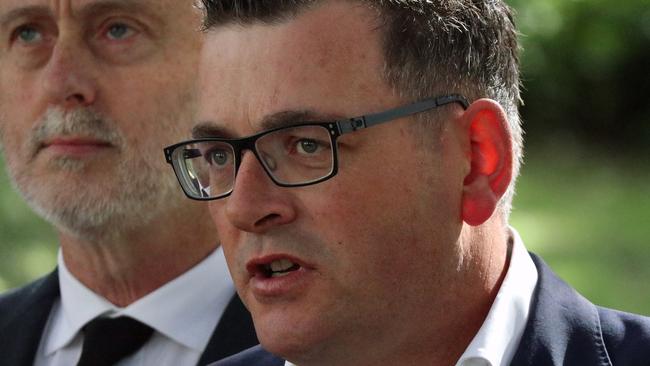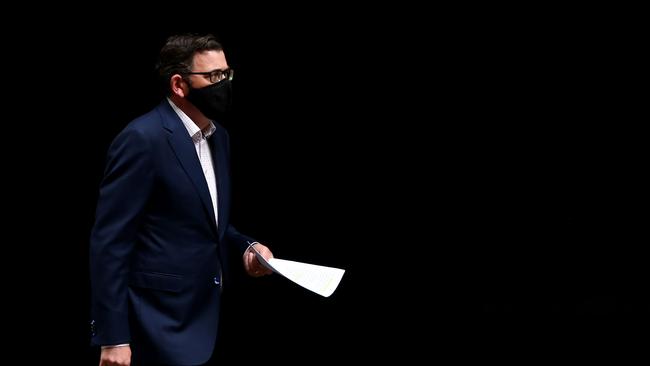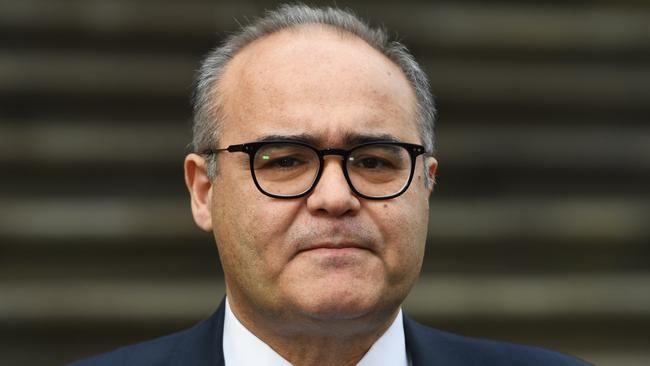Adem Somyurek: Why power is deep in Daniel Andrews’ DNA
The fact Victoria has suffered the worst public policy disaster in Australian history - and still no one knows who made key decisions that caused the disaster - proves backroom political operators should never be given party leadership again, writes Adem Somyurek.
Being a minister at the time of the now infamous “creeping assumption” decision to use private security guards in hotel quarantine, I share responsibility for the death of 780 Victorians, the cratering of our once strong economy and the locking down of the entire state.
Not because I was part of a collective cabinet decision-making process, but because I failed to insist the Premier comply with a proper cabinet process.
As the only former minister not constrained by party discipline, it is in the public interest that I attempt to shed light on how we got into such a mess, with so much pain and destruction for so many Victorians.
What is not in evidence before the inquiry is the decision-making processes of the executive and the potential intermediary role played by their staff (particularly the Premier’s staff). Therefore, it is assumed that the executive is captured by the bureaucracy whereas, in reality, the bureaucracy is docile and subservient to the micromanaging and commanding style of the Premier.
Daniel Andrews and I go back a long way, some 23 years to when we were rivals in opposing warring factional camps in the south east. Andrews was a key operator in one of the most brutal factional operations in the party — the southeastern Socialist Left. He was rewarded for his service with an elevation to assistant state secretary and then to a seat in parliament.

Andrews may be the only hard-core factional apparatchik to have ever become the Premier of a state government in Australia. The fact that Victoria has suffered the worst public policy disaster in Australian history, and still no one knows who made key decisions that caused the disaster, will affirm that backroom political operators should not be put in party leadership ever again.
Until hotel quarantine, Andrews had been lucky — he appeared to be pulling it off. There is good reason why factional apparatchik are not premiers.
They operate within informal, opaque processes, where scrutiny and transparency is non-existent and where written communication is discouraged. Factional operators are more interested in outcomes than procedural niceties. Andrews cut his teeth in this political milieu.
There is a certain degree of leeway that is afforded to reforming leaders with regard to due process in the belief that the ends justify the means. Therefore, Andrews’ crash-through style was mostly accepted as strong leadership — but those in the know always understood the dangers.
These learned reflexes were largely kept in check by former leader of the government in the Legislative Council, Gavin Jennings. He was both Andrews’ mentor and protector.
Jennings believed in the institution of parliament and cabinet government. Jennings understood that due process and collective decision making was there to provide good governance and protection. Andrews on the other hand believed due process was a waste of time and an unnecessary obstruction.

The retirement of Jennings from parliament in mid-March, removed any constraint left on Andrews. Within weeks, by April 3, Andrews had killed off cabinet government with the introduction of a “Crisis Cabinet.”
On March 27, he publicly decreed the use of private security guards in hotel quarantine without any cabinet decision at all.
Given Andrews’ penchant for informal processes, we do not have a definitive answer to the important question of who made the decision to use private security guards — but through deductive reasoning we can come up with a strong probability.
The fact is the hotel quarantine should have come before cabinet, and then the cabinet decision should have been operationalised by agencies and departments. This never happened. It is custom and practice for government policy decisions, legislation and spending decisions to go to cabinet, where 22 ministers, their staff and departments apply a rigorous level of scrutiny to proposals from ministers so that weaknesses or flaws can be identified.

A routine cabinet proposal requires among other things objectives, key issues, risks associated with the proposal, consultation, and stakeholder feedback. A minister taking to cabinet a hotel quarantine proposal with compliance managed by private security would have been questioned relentlessly given the industry’s sleazy reputation.
Ministers and public servants are intrinsically risk-averse, therefore there is very little likelihood that a minister would have taken such a risky proposal to cabinet unless prompted to do so by the leader.
Furthermore, quarantine is a federal matter, therefore portfolio responsibility falls to the Premier unless he allocates it to another minister. Andrews seems not to have done this before the announcement was made to use private security guards which means the ministerial responsibility buck stops with him.
Within government, that Andrews made the decision to use private security guards is not a matter of conjecture. Why he chose to make such a risky decision is a matter of much speculation.
For the first time in his leadership of 10 years, Andrews found himself without the calming guidance of Gavin Jennings. The result is the biggest public policy disaster in Australian history.
In Andrews’ government, everything is centralised and micromanaged, even the most talented ministers lack autonomy and the bureaucracy is cowered by central control. Take it from me, nothing happens by “creeping assumption” in this tightly controlled government.
Adem Somyurek is a former Labor minister

